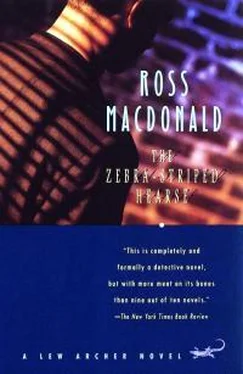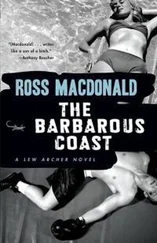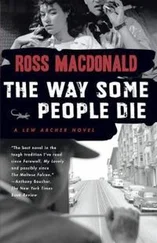I reached deep for her movie name, but I couldn’t quite dredge it up.
“You’re fairly pretty,” she said. “Isn’t that Claude Stacy’s sweater you’re wearing?”
“He lent it to me. My clothes got rained on.”
“I gave him that sweater. Are you a friend of Claude’s?”
“Not an intimate one.”
“That’s good. You don’t look his type. Do you like women?”
“Put the gun away and I’ll give you a truthful answer,” I said with the necessary smile.
She responded with a smile of her own, a 1929 smile that rested on her mouth like a footnote to history. “Don’t let the gun bother you. I learned to handle a gun when I was playing in westerns. My husband insists I keep it handy when I’m alone at night. Which I usually am.”
She laid the revolver down on a table near the door and turned back to me. “You haven’t told me if you like women or not.”
“I like individual women. I’ve liked you, for example, for a longer time than either of us would care to admit.” The name she had used as an actress had come back to me. “You’re Helen Holmes, aren’t you?”
She lit up coldly and brightly, like a marquee. “You remember me. I thought everyone had forgotten.”
“I was a fan,” I said, spreading it not too thick.
“How nice!” She clenched her hands at her shoulders and jumped a few inches off the floor, with both feet, her smile immobile. “For that you may sit you down and I’ll pour you a drink and tell you anything you want to know. Except about me. Name your poison.”
“Gin and tonic, since you’re so kind.”
“One gin and tonic coming up.”
She turned on a gilt chandelier which hung like a barbaric treasure among the ceiling beams. The room was like an auctioneer’s warehouse, crowded with furniture of various periods and countries. Against a distant wall stood an ornately carved bar, backed by shelves of bottles, with half a dozen leather-covered stools in front of it.
“Come sit at the bar. It’s cozier.”
I sat and watched her mix my drink. For herself she compounded something out of tequila and grenadine, with coarse salt sprinkled around the rim of the glass. She stayed behind the bar to drink it, leaning on her forearms and exposing her bosom like a barmaid favoring a customer.
“I won’t waste time beating around the bush. I’m interested in Burke Damis. You know him, Mrs. Wilkinson?”
“Slightly. He is, or was, a friend of my husband’s.”
“Why do you put it in the past tense?”
“They had a quarrel, some time before Mr. Damis left here.”
“What about?”
“You ask very direct questions.”
“I don’t have time for my usual subtlety.”
“That must be something to experience.”
“Oh, it is. What did they quarrel about?”
“Me, if you have to know. Poor little old me.” She fluttered her eyelashes. “I was afraid they were going to kill each other, honestly. But Bill contented himself with burning the picture. That way he got back at both of us.” She raised one hand like a witness. “Now don’t ask me for doing what. There wasn’t any what. It’s just that Bill is very insecure in our relationship.”
“He burned the ‘Portrait of an Unknown Woman’?”
“Yes, and I haven’t forgiven him for it,” she said, as though this were proof of character. “He broke up the frame and tore the canvas and put the whole thing in the fireplace and set fire to it. Bill can be quite violent sometimes.”
She sipped her drink and licked the salt from her lips with a pale pointed tongue. She reminded me of a cat, not a domestic cat, but one of the larger breeds that could stalk men. Her bright lips seemed to be savoring the memory of violence.
“Did Damis know the picture was destroyed?”
“I told him. It broke him up. He wept actual tears, can you imagine?”
“I wonder why.”
“It was his best picture, he said. I liked it, too.”
“I heard he’d tried to buy it back.”
“He did, but I wouldn’t part with it.” Between the shadowed lids her eyes were watchful. “Who else have you been talking to?”
“Various people around the village.”
“Claude Stacy?”
“No. Not yet.”
“Why are you so interested in that particular picture?”
“I’m interested in everything Damis does.”
“You mentioned a crime that occurred up north. Do you want to let down your back hair about it? I’ve been letting down my back hair.”
I told her what had happened to Quincy Ralph Simpson. She looked somehow disappointed, as if she’d been expecting something more lurid.
“This is all new to me,” she said. “There’s nothing I can tell you about Simpson.”
“Let’s get back to the picture then. Damis called it a portrait. Did he ever say who the subject of it was?”
“He never did,” she said shortly.
“Do you have any ideas?”
She shrugged her shoulders and made a stupid face, with her mouth turned down at the corners.
“You must have had a reason for buying the painting and wanting to keep it. Your husband cared enough about it to burn it.”
“I don’t know who the woman was,” she said, too forcefully.
“I think you do.”
“Think away. You’re getting rather boring. It’s late, and I have a headache.” She drew her fingers across her forehead. “Why don’t you drink up and go?”
I left my drink where it was on the bar between us. “I’m sorry if I pressed too hard. I didn’t mean to–”
“Didn’t you?” She finished her drink and came around the end of the bar, licking her lips. “Come on, I’ll let you out.”
It had been a very quick party. Reluctantly I followed her to the door.
“I was hoping to ask you some questions about Harriet Blackwell. I understand Damis met her here at your house.”
“So what?” she said, and pulled the door open. “Out.”
She slammed it behind me. In the dooryard I bumped my head on the same low-hanging fruit. I picked it – it was a mango – and took it along with me as a souvenir.
It was a long walk back, but I rather enjoyed it. It gave me a chance to think, among other things about Helen Holmes Wilkinson. Our rather tenuous relationship, based on Claude Stacy’s sweater and my remembering her movie name, had broken down over the identity of the woman in the burned portrait. I would give odds that she knew who the woman was and what her connection with Damis had been.
I wondered about Helen’s own connection with Damis.
Headlights approached me, coming very fast from the direction of the village. They belonged to a beetle-shaped Porsche which swerved in long arcs from one side of the road to the other. I had to slide into the ditch to avoid being run over. As the Porsche went by I caught a glimpse of the driver’s face, pale under flying dark hair. I threw my mango at him.
The clock chimed two quarters – half-past two – as I struggled through the village to the posada . In the room behind the desk, Claude Stacy was sleeping in his clothes on a mohair couch. It was a couch with one high end, the kind psychiatrists use, and he was curled up on it in fetal position.
I shook him. He grimaced and snorted like a huge old baby being born into a world he never made.
“What is it?”
“I met a friend of yours tonight. Helen Wilkinson. She mentioned you.”
“Did she now?” He took a comb out of his pocket and ran it through his thinning hair. “I hope it was complimentary.”
“Very,” I lied.
He basked in the imaginary compliment. “Oh, Helen and I get along. If Bill Wilkinson hadn’t got to her first I might have thought of marrying her myself.” He thought about it now. “She used to be in pictures, you know, and she saved her money. I did some acting at one time myself. But I didn’t hang on to any money.”
Читать дальше












